| Solomon Wardell (no photo of Ellen available) |
History of Solomon Wardell and His Wife Ellen McKell Matheson
Written by their granddaughter Afton Whitney Hannig
The only dates I have for this history are those taken from genealogical and church records. Whatever else I write is from memory of stories mother told me years ago before her death. I do not remember the proper sequence of these stories, but because they show the faith and courage and kindness of my grandparents, I will write them as I remember them.
My grandfather, Solomon Wardle (Wardell) was born 20 Jul 1841 in Hallgreen, Warwickshire, England. He was the eldest of four children born to John and Sarah (Tracy) Wardle or Wardell. His parent were converted to the Church of Jesus Christ of latter Day Saints in 1847 and left England for America soon after that time. They lived in Illinois and Iowa for several years, and then came to Salt Lake City, Utah in the S. Louis Company, arriving 19 August 1853. They lived in Salt Lake City one month, and then moved to Parowan, Iron, Utah were they made their home and Solomon grew to manhood. He learned to be a shoemaker and a beekeeper, and practiced both trades throughout his life.
However, in his early manhood, he took time from his trades to answer the call of the Church leaders to go back along the pioneer trail to help other saints on their trek to the Salt Lake Valley. It was on One of these trips that he met his future wife, Ellen Matheson.
Ellen McKell Matheson was born 7 November 1848 in Newtyle, Farfor, Scotland. She was one of eighteen children born to Daniel and Catherine (Treasurer) Matheson. However, due to measles and other epidemics and tragedies, only Ellen and five of her brothers grew to adulthood. (Note: Other sources state that they had thirteen children.) Her family accepted the gospel of Latter-Day Saints the year Ellen was born and in due time she was baptized. The story of what is known of her childhood and the journey to America is the history of Daniel and Catherine Matheson, her parents.
Ellen was a girl of fifteen, just blooming into womanhood in 1862 when she, with her family crossed the plains. On the journey, Ellen got the mountain fever (Typhoid?), and in the critical stage of the illness she was thrown into the Platte River as the lurching wagons were crossing the river. She never fully recovered from this accident and illness and was an invalid most of her life. However, in spite of this and other hardships, she lived a useful and a happy life, and was the mother of eight children.
It was also on the trip across the plains that Ellen met the tall, blue-eyed young man who would later become her husband. He was Solomon Wardle and had been sent by the Church Authorities to meet the company of Saints and assist them on their journey to the Salt Lake Valley. A few years later when Ellen was about eighteen, they were married, making Parowan their home when they were not answering the call of Church leaders to help settle other parts of the west.
I believe it was in the first summer or autumn of their marriage that the following incident occurred. Sol and Ellen were living in a cabin up on the mountain when Sol cut wood or timbres. Sometimes it was necessary for him to be gone overnight or perhaps several days. Food was very scarce and they had no leavening of any kind. But Ellen would cook a slab of unleavened whole wheat bread, cut it in squares and put it in Sol’s coat pockets, and that would be his supply of food for the time he would be gone.
 |
| Making Lye Soap |
Before the birth of their first child, Ellen and Sol were helping settle Panguitch. It was at the time of the Black Hawk Indian War and while they were there, the Indians went on the warpath and the settlers were called back to Parowan. It was cold and the snow was several feet deep on the mountain. Sol’s only conveyance was an old horse, so he put Ellen and their few belongings on the horse and he walked leading the lunging animal through the drifts of snow. As a result of this difficult trip, their baby was born before its time, 12 April 1867, and died the same day.
Sol and Ellen made their home in Parowan for the next ten or twelve years where my mother, Julia, and four other children were born. Mother was born 23 June 1868; John Daniel, 5 January 1870; Elizabeth, 7 August 1872; Mary Ellen, 21 January 1875; and Lydia Jane, 19 May 1877.
My mother, Julia, being the eldest of the children was the cook and housekeeper from the time she was six years old since Ellen was an invalid most of the time.
In the spring and autumn when the sheep herds moved between the winter and summer ranges, Julia and the younger children would go out on the hills and gather wool from the bushes where the sheep had passed. Then Ellen and Julia would cord and spin the wool and make clothing for the family.
| Solomon Wardell in Shoe Shop Cowley, Wyoming |
I do not know when or where the following incident occurred, but it was when the children were small and I believe it was at their home in Parowan. It shows the great tender heart of Solomon. He often played with the children and on this summer day he was in the yard playing with them when a bluebird lit on the fence some distance away. Sol picked up a stone and in fun said, “Watch me hit that bird.” The children laughed because their father was a notoriously bad shot. But inadvertently the stone hit the bird and killed it. The bird was tenderly buried and it was a sad affair with Solomon and the children all crying. The kind-hearted father never forgave himself.
The following incident shows how the Lord was watching over this good family. Again I do not know if it happened in Parowan or one of the settlements where they had been called. However, it was when Julia was a girl. She idolized her father and when she could get away from the household chores, she would go to the field with him while he cared for the crops. The field was some distance from their home, and on this occasion, a storm had come up and they were walking home together. Sol always carried his tools on his left shoulder and Julia was walking close to him on his left. Suddenly he moved the ax and other tools from his left to his right shoulder. A moment later a lightening bold knocked the tools violently to the ground. Had they been on the other shoulder, no doubt Julia would have been killed or seriously injured. So great was the faith of this good man and his family, they always believed a guardian angel or the Lord had inspired Solomon to move the tools to the other shoulder.
Sometime between 1877 and 1885, Solomon and Ellen received a call to help settle Snowflake, Arizona. I asked my mother why they did not refuse the call since Ellen was so ill. She said that such a thing never entered their minds, so great was their faith in President Brigham Young as a Prophet of the Lord.
So with many other Saints, they arranged their affairs, and the long journey began which would take them over rugged mountains, across the Colorado River at Lee’s Ferry, and over deserts and hills.
Their trip took many weeks longer than expected and the whole company ran out of food. Their plight was desperate so, as was usual with these faithful pioneers, they put their trust in the Lord. The company was called together and they prayed for food to take them to their journey’s end. The next morning they hitched up their teams and wagons and continued their journey through a vast meadow in the Arizona Mountains where the green grass grew tall.
All that day a large fat heifer kept joining the company’s animals. The men and boys would drive it away but it would return. All day they tried in vain to keep the heifer away from the wagon train. When evening came a council was called and since there was no mark or brand on the animal to show that it belonged to anyone, it was decided this was the answer to their prayers. The heifer was butchered and the Saints rejoiced in having food again.
As they approached the town of St. Joseph where the United Order was practiced, they saw a strange sight come over the brow of the hill toward them. It proved to be dozens and dozens of loaves of bread and goodies piled high on a huge wheelbarrow. All that could be seen of the town baker, who was pushing the wheelbarrow, was his high white baker’s hat, so high was the bread stacked. Again, the hungry Saints had cause to rejoice. A scout had ridden into the town to tell the plight of the pioneer company. When they arrived in St. Joe they were given a royal welcome and invited into the big town dining room for hearty meals.
After arriving in Snowflake, Solomon and Ellen and their children lived in a dugout, as did many of the other Saints. Each morning the children went out in the fields and gleaned the heads of wheat after the harvesters had passed. Then they would thresh the wheat and grind it in a small hand operated coffee mill and cook it for their breakfast. What was left was used for the other meals along with sego roots and game. The milk was portioned out to them with a tablespoon.
I suppose there are in every family descended from pioneers, stories and sayings which come out of the regular hazards of pioneer life. Often these events were tragedies or near tragedies, but in the telling they have brought smiles and laughter. In our own family, whenever we children had ravenous appetites, and it seemed to Mama like she was pouring food into bottomless pits, she would say we had a “take-in” like Mrs. Oakley. This always brought gales of laughter from us if thee were friends or strangers among us, it meant a retelling of the story of Mrs. Oakley. If there are descendents of that good woman, I hope they will forgive the telling of the story and realize that we are laughing “with” her and not “at” her. No doubt she and her husband got many a good laugh out of the incident for it was a good trick as long as it lasted, and that was quite a while.
Sol and Ellen were among the victims and the event took place in those difficult days in the pioneering of Snowflake. Food was scarce and what they had was difficult to obtain. In those trying times, there was a couple, Mr. and Mrs. Oakley, who lived in a house surrounded by a high board or slab fence. Mrs. Oakley was supposed to be a very sick woman. Whatever her illness, she seemed to require the very best food and a lot of it. The Saints rallied to the aid of this couple, each family taking its turn and the very best was taken to Mrs. Oakley. If Sol went hunting and brought in game, the choice cuts did not go to the ailing Ellen nor to the hungry Wardle family, but were prepared with care and taken to Mrs. Oakley. Other struggling families took their turns.
This went on for a long time until one day two good sisters bearing the daily gifts arrived at the Oakley home much earlier than usual, and going unnoticed through the accidentally unlocked gate in the slab fence, they knocked on the door. There was no answer and fearing the poor woman had passed away, they went into the house. She was not there. Making their way to the back yard, they were dumb-founded to find Mrs. Oakley in her nightgown, helping her husband life the wagon box up on the wheels. Needless to say, there were no more goodies taken to Mrs. Oakley.
I do not know if the following event occurred in the Snowflake Mission or another, but this story came down to us from Sol and Ellen.
It seems there was an Indian uprising and the Saints had to flee into the forest for protection. In those days the most prized possessions was a feather bed, and the most essential article was a gun.
In the settlement was a Danish couple, and as the Saints hurried for the protection of the forest, Hannah grabbed the feather bed, and her husband took the gun. They scurried from tree to tree, those with guns trying to get a shot at the Indians. Finally, all out of breath, the Danish man said, “Give me the feather bed, Hannah, and you take the gun. I’m so tremble I can’t shoot.”
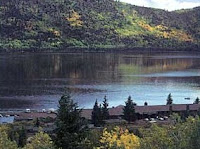 |
| Fish Lake |
The Wardells did not remain in Snowflake to make their permanent home. When their mission was completed, they returned to Utah. Evidently they went to Junction over the Sevier River, for according to my records, the next child, Sarah Alice, was born there 3 June 1885. I do not know if this was another mission, or if they went of their own accord. I have heard my mother speak of their sojourn there, and I believe it was while they lived there that Sol took the family on an excursion to Fish Lake. I remember what an impression that trip made on my mother and the other children.
 |
| Ellen M. Wardell 1848-1887 |
Solomon was heartbroken after Ellen’s death, and although he tried to hold the family together, it was soon broken up. Some of the older ones going off to work, and troubles besetting others. 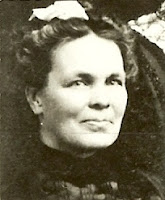 |
| Sarah Permelia Holyoak Robb Wardell |
Because of poor transportation in those days, mother was out of touch with her family except for occasional letters. Her sister, Mary, married Christian Ronnow and lived in Panaca, Nevada until her death, 15 July 1952.
Elizabeth (Aunt Lizzie) married John L. Edwards and also lived in Panaca. In researching the old Panaca Ward records, I found that Sol and the children had lived in Panaca for a time after Ellen’s death. I suppose it was at this time that the girls met and married the Panaca boys.
John never married and he was a wanderer. Solomon Alexander (young Sol) moved to Wyoming with his father. He married Sarah Alice Robb.
Ellen’s youngest daughter, Sarah Alice, married William McLoud and later Mr. Thompson. She was living in Ely, Nevada at the time of Aunt Mary’s death.
In 1894, my mother, Julia’s, first husband passed away leaving her with three small children. In 1897, she married my father, George Luke Whitney, and in due time we four children came along. I being, the youngest.
In 1914, as usual, we were spending the summer on our ranch in the Bunkerville Mountains, twenty miles from St. Thomas, Nevada. In that year, we were delighted when our grandfather, Solomon Wardle came to spend the summer with us.
Still being proficient in bee culture, he soon had a row of beehives at the edge of the orchard. What an exciting time it was for us children when we helped him find and capture a swarm of bees. And we watched with wonder his skill in repairing our shoes.
On the 12th day of July, Grandpa Wardle ate his breakfast and went over in the field to cut stakes for the string beans. Unaccustomed to idleness, he insisted on helping around the ranch. After he had eaten his noon meal, Mama could see that he did not feel well, but when she talked to him he said he was all right, only had a little hurt in his chest. She persuaded him to go up in a quiet room on the upper terrace and rest before staking the beans. An hour or two later we heard one of our renters scream, and as well all came running, we saw Grandpa, lying on the doorstep.
A few moments later, Solomon had joined his Ellen in the “great beyond” as he lay in his beloved Julia’s arms. He had awakened from his nap and as he came out of the door, he had a fatal heart attack. We were all brokenhearted, for we loved him dearly.
I remember the hurried preparations and the trip into town with Papa and Mama sitting in the wagon seat with we younger children folded into a bed under the seat and the older children sitting besides Grandpa’s body in the rear of the wagon. My teenage brother, Fenton, had been sent to town on a galloping horse to take the news so preparations could be made for the funeral and burial. The weather was extremely hot and with none of our modern facilities, it was impossible to take the body to Parowan or wait for his distant loved ones to come.
The journey to town, the funeral, and the burial had to be done quickly and in the cool of the night and early morning. I remember the funeral on the lawn of our St. Thomas home and the burial up on the hill. But most of all I remember the stories my mother told of her beloved parents, Ellen and Solomon Wardle, and of their fine and happy lives in spite of poverty and illness and hardships. As she told the stories, I could feel her great love and respect and admiration for them in her voice and in the expression of her eyes.
Long after our grandfather passed away, the row of white beehives stood at the edge of the orchard and the old cobblers tools had constant use, but not with the old deft touch. And the things he had planted, grew and grew.
When I visited Parowan several years ago doing research on the Wardle (Wardell) and Matheson lines, a relative told me that Solomon was noted for his green thumb; and that several homes he had made for his family had been garden spots with trees, vines and flowers as well as the essential vegetable garden. I like to think my love for growing things has come to me from him through my sweet mother. She, like her father, Solomon, always had beautiful flowers growing around her.







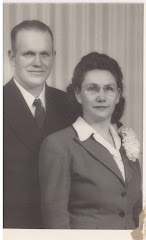

.jpg)
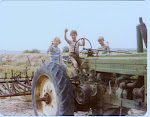




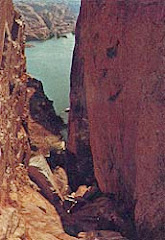

+Farm+Cowley,+Wyoming.jpg)
.jpg)







